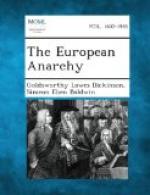Among us, too, there is a spirit of chauvinism
which is increasing,
which I deplore, and against which we
ought to react. Half the theatres
in Paris now play chauvinistic and nationalistic
pieces.
The note of alarm becomes more urgent as the days go on. On January 16, 1914, the Baron writes:—
I have already had the honour to tell you that it is mm. Poincare, Delcasse, Millerand and their friends who have invented and pursued the nationalistic and chauvinistic policy which menaces to-day the peace of Europe, and of which we have noted the renaissance. It is a danger for Europe and for Belgium. I see in it the greatest peril, which menaces the peace of Europe to-day; not that I have the right to suppose that the Government of the Republic is disposed deliberately to trouble the peace, rather I believe the contrary; but the attitude that the Barthou Cabinet has taken up is, in my judgment, the determining cause of an excess of militaristic tendencies in Germany.
It is clear from these quotations, and it is for this reason alone that I give them, that France, supported by the other members of the Triple Entente, could appear, and did appear, as much a menace to Germany as Germany appeared a menace to France; that in France, as in other countries, there was jingoism as well as pacifism; and that the inability of French public opinion to acquiesce in the loss of Alsace-Lorraine was an active factor in the unrest of Europe. Once more I state these facts, I do not criticize them. They are essential to the comprehension of the international situation.
5. Russia.
We have spoken so far of the West. But the Entente between France and Russia, dating from 1894, brought the latter into direct contact with Eastern policy. The motives and even the terms of the Dual Alliance are imperfectly known. Considerations of high finance are supposed to have been an important factor in it. But the main intention, no doubt, was to strengthen both Powers in the case of a possible conflict with Germany. The chances of war between Germany and France were thus definitely increased, for now there could hardly be an Eastern war without a Western one. Germany must therefore regard herself as compelled to wage war, if war should come, on both fronts; and in all her fears or her ambitions this consideration must play a principal part. Friction in the East must involve friction in the West, and vice versa. What were the causes of friction in the West we have seen. Let us now consider the cause of friction in the East.




